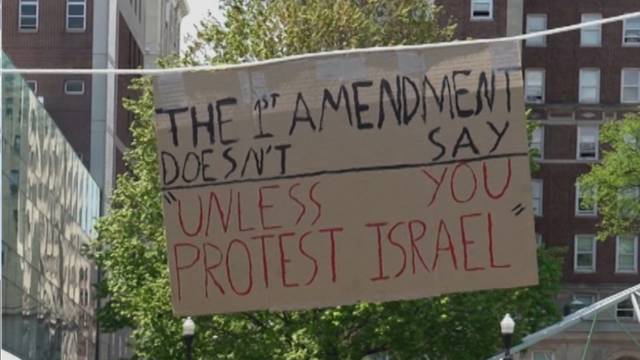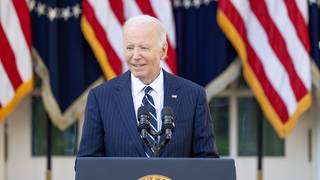
By Amy Goodman & Denis Moynihan
World Press Freedom Day comes this week amidst Gaza solidarity protests on campuses across the United States. In a democratic society, protests and the press are intimately linked. Desperate to clamp down on the growing movement, university administrations and police are increasingly restricting or outright banning the press from campus grounds. As protesters are subject to violent arrests, we need an independent press to hold those in power accountable, and to document this nationwide attempt to suppress free speech.
And it goes beyond free speech. We need to hear students’ voices, why they are risking suspension and expulsion and in all-too-many cases their personal safety, joining millions of people across the country who are deeply concerned about Israel’s assault on Gaza, about the US providing the weapons for that attack, and about university investments in companies that profit from war. These student protests echo those against the Vietnam war in the 60s and 70s, and calls to divest from South African apartheid in the 70s and 80s.
Weeks ago at Columbia University, the epicenter of the current movement, President Minouche Shafik called in the New York Police Department (NYPD) which arrested over 100 students. She locked down the campus, preventing many journalists from covering the encampment. Soon after, the Columbia School of Journalism, or J-School, one of the most prominent in the world, stated on social media that they would facilitate access to journalists wanting to cover this important story, a clear challenge to university policy.
Despite Shafik’s efforts to quash the protest, another encampment grew. When she issued yet another ultimatum, students occupied Hamilton Hall, renaming it Hind’s Hall, after a six-year-old girl brutally killed by Israeli forces in Gaza. Shafik again called in the NYPD the next night. The police stormed the building and arrested another 100 students, inside and out.
Gillian Goodman, a Columbia J-School student, was on campus that night. “Myself and my colleagues at the Journalism School were pushed with police batons to our backs and corralled out of the space, so we were not able to witness the arrests head on,” Gillian said on the Democracy Now! news hour. “[The police] were extremely clear and efficient that they were not to have any eyewitnesses, including the majority of press, during the time that the arrests were made.”
Police threatened students if they stepped outside the J-School, based in Pulitzer Hall, they would be arrested.
Across the country in Los Angeles, also on Tuesday night, the UCLA Gaza solidarity encampment was physically attacked by a violent pro-Israel group. The LA Times reported that when the police finally arrived, they simply watched. The university’s student paper, The Daily Bruin, wrote in an editorial published hours later,
“It began with ear-piercing screams of wailing babies loudly emitting from speakers. Counter-protesters tearing down the barricades. Laser pointers flashing into the encampment. People in masks waving strobe lights. Tear gas. Pepper spray. Violent beatings.”
Shaanth Kodialam Nanguneri, Bruin senior staff writer, who was there with three other Bruin reporters, described the scene on Democracy Now!:
“It was about 2 or 3 a.m…We had all spent hours being out there on the field reporting, sending messages to our editors, really scared about the scenes that we were seeing on campus towards the protesters in the encampment, the level of violence and vitriol that was in the air…I personally witnessed a counter-protester slam a wooden slab onto an individual who had her hands on the barricade of the encampment and smashing her fingers, and listening to her scream.”
The pro-Israel vigilantes then accosted the four reporters:
“We were leaving and were vulnerable and were in a small group, we were encircled and attacked,” Shaanth continued.
“They started shining lights in our face, spraying us with very strong irritants, circling in particular one of my colleagues and physically harassing and violently assaulting her.”
The reporters managed to escape. One of them was briefly hospitalized.
The Bruin’s editorial addressed the UCLA administration: “The world is watching. As helicopters fly over Royce Hall, we have a question. Will someone have to die on our campus tonight for you to intervene?”
On Thursday, the Pulitzer Prize Board issued a statement, “to recognize the tireless efforts of student journalists across our nation’s college campuses, who are covering protests and unrest in the face of great personal and academic risk…In the spirit of press freedom, these students worked to document a major national news event under difficult and dangerous circumstances and at risk of arrest.”
In this election year, with the likelihood of mass protests at the Democratic and Republican National Conventions, let us remember: a free press is essential to the functioning of a democratic society.











Media Options